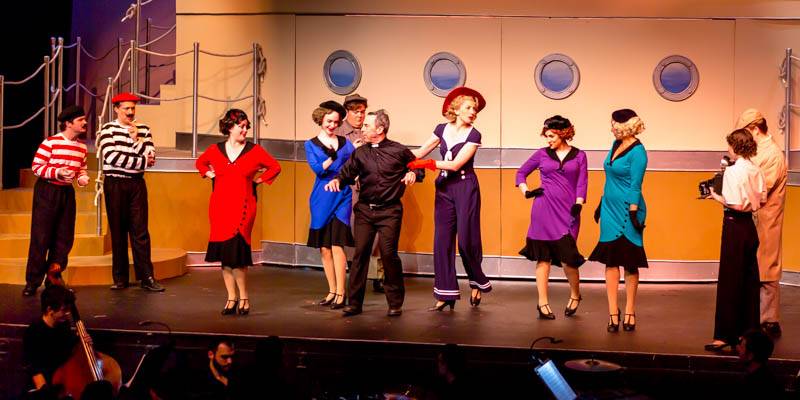In our preview of Anything Goes last week, the show’s director, Julia Megan Sullivan, described is as a “musical for people who enjoy musicals.” I think it’s certainly true that if you don’t enjoy musicals, this is not a show that will change your mind. Unfortunately, I found that even as someone who does enjoy musicals, Anything Goes left me a bit cold.
This is no reflection on the very creative local talent involved in this particular production, who mostly do their best with what they have to work with, but rather that the Cole Porter music, fantastic though it is, can only do so much to offset a fairly weak plot that offers little in the way of emotional engagement and primarily consists of a series of mildly humorous jokes delivered to fill the time between songs. Some musicals age better than others, and I don’t think Anything Goes is destined to appear on my list of favorites anytime soon. That being said, however, a lot of hard work has gone into this local production and there are certainly aspects of it that I did appreciate.
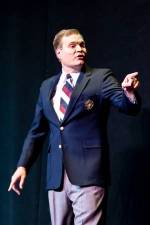 The love story at the heart of Anything Goes is between Billy Crocker (Ray Essick, pictured right) and debutante Hope Harcourt (Abby Gailey), who, as so many fictional rich girls do, has managed to get herself into a loveless engagement to a wealthy aristocrat despite her true feelings lying elsewhere. When a love-struck Billy spots Hope with her fiancé Lord Evelyn Oakleigh (Jake Smith) on
The love story at the heart of Anything Goes is between Billy Crocker (Ray Essick, pictured right) and debutante Hope Harcourt (Abby Gailey), who, as so many fictional rich girls do, has managed to get herself into a loveless engagement to a wealthy aristocrat despite her true feelings lying elsewhere. When a love-struck Billy spots Hope with her fiancé Lord Evelyn Oakleigh (Jake Smith) on 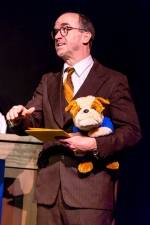 board an ocean liner prior to departure, he contrives to smuggle himself on board as well with the help of undercover gangsters Moonface Martin (Jeff Dare) and Erma (Tafadzwa Diener). Since Billy’s boss (David Heckman, pictured left) is also on board and expects Billy to be back on land ensuring important stock trading happens, Billy has to adopt a variety of disguises as he pursues Hope and tries to get her to change her mind about marrying Evelyn. Naturally, hijinks ensue.
board an ocean liner prior to departure, he contrives to smuggle himself on board as well with the help of undercover gangsters Moonface Martin (Jeff Dare) and Erma (Tafadzwa Diener). Since Billy’s boss (David Heckman, pictured left) is also on board and expects Billy to be back on land ensuring important stock trading happens, Billy has to adopt a variety of disguises as he pursues Hope and tries to get her to change her mind about marrying Evelyn. Naturally, hijinks ensue.
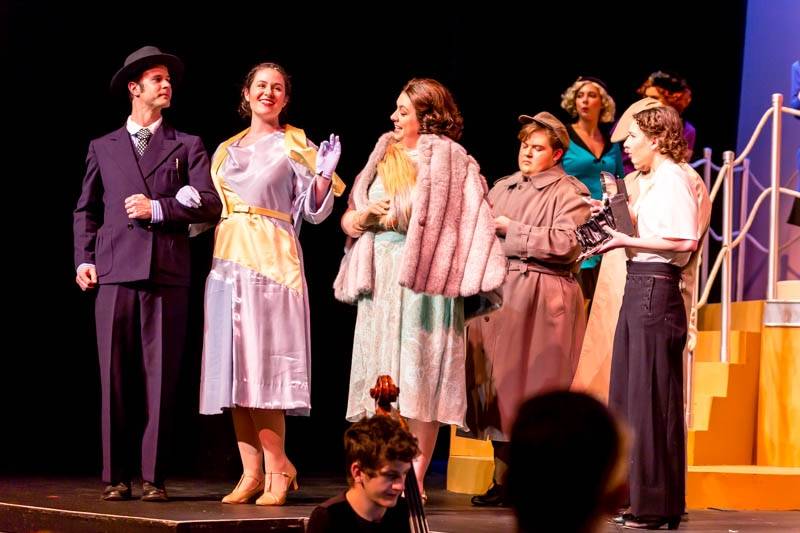
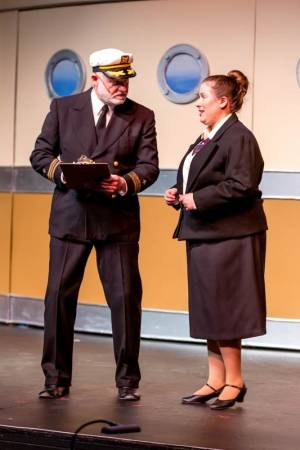 The ship has a long list of quirky passengers, of course, including Hope’s high-strung mother, played ably by Jenny Gleason, and a reverend (John Tilford) who is bringing back two converts from France who he’s hoping to woo away from their dissolute lives of gambling and drinking. The idea that someone would have gone to France in the 1930s to convert young white men to Christianity was a bit baffling to me. I’ve since learned that an offical update of the play used the French characters to replace a highly offensive portrayal of Chinese people in the original version. As the beret-clad French characters are still an over-the-top cultural stereotype, I’m not convinced they totally “fixed” things, but I’m glad they at least made an attempt. The captain of the ship (Dennis Sims) is worried that he doesn’t have enough celebrities on board to please his passengers and is also increasingly worried about the mental health of Hope’s mother, and Sims does a nice job with the humorous moments his role includes.
The ship has a long list of quirky passengers, of course, including Hope’s high-strung mother, played ably by Jenny Gleason, and a reverend (John Tilford) who is bringing back two converts from France who he’s hoping to woo away from their dissolute lives of gambling and drinking. The idea that someone would have gone to France in the 1930s to convert young white men to Christianity was a bit baffling to me. I’ve since learned that an offical update of the play used the French characters to replace a highly offensive portrayal of Chinese people in the original version. As the beret-clad French characters are still an over-the-top cultural stereotype, I’m not convinced they totally “fixed” things, but I’m glad they at least made an attempt. The captain of the ship (Dennis Sims) is worried that he doesn’t have enough celebrities on board to please his passengers and is also increasingly worried about the mental health of Hope’s mother, and Sims does a nice job with the humorous moments his role includes.
As Billy and Hope, Essick and Gailey make a sweet onstage couple and did particularly well in their musical numbers together, including one of the show’s best-known songs, “De-Lovely”. Though Gailey certainly has a stronger voice than Essick (in general the women in this show far outshone the men vocally), Essick gave Billy an endearing “everyman” quality that lent charm to their duets when paired with Gailey’s grace and elegance. Their emotional Act II rendition of “All Through the Night” was touching and perhaps one of the few moments in the show where I felt I truly cared about fates of the characters I was watching.
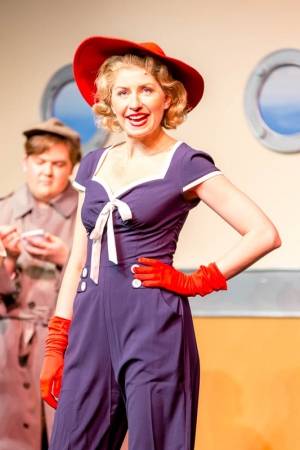 J. Malia Andrus, a familiar face on the local theater scene, plays Reno Kelly, the somewhat jaded leader of a group of showgirls who has a soft spot for Billy. Though her vocals were always impressive from a technical standpoint, Andrus’s heart didn’t seem to be in some of the early numbers, particularly in her surprisingly passionless rendition of “I Get a Kick Out of You,” the very first number in Act One. The staging didn’t help matters, as Billy and Reno had little to no interaction with each other during the number despite her supposedly addressing it to him. Fortunately Andrus seemed to relax as the show went on and found her usual confidence and charismatic stage presence for some of the later songs, especially her duet with Moonface Martin and her big Act II showstopper “Blow, Gabriel, Blow.”
J. Malia Andrus, a familiar face on the local theater scene, plays Reno Kelly, the somewhat jaded leader of a group of showgirls who has a soft spot for Billy. Though her vocals were always impressive from a technical standpoint, Andrus’s heart didn’t seem to be in some of the early numbers, particularly in her surprisingly passionless rendition of “I Get a Kick Out of You,” the very first number in Act One. The staging didn’t help matters, as Billy and Reno had little to no interaction with each other during the number despite her supposedly addressing it to him. Fortunately Andrus seemed to relax as the show went on and found her usual confidence and charismatic stage presence for some of the later songs, especially her duet with Moonface Martin and her big Act II showstopper “Blow, Gabriel, Blow.”
Jeff Dare and Tafadzwa Diener provided big laughs throughout the show in their roles as incognito gangsters Moonface Martin and Erma, and I looked forward to the scenes when either of them were onstage. Whether helpfully stealing Billy’s boss’s glasses or lamenting his low ranking on the “public enemy” list, Dare made Moonface a charming figure who was easy to root for 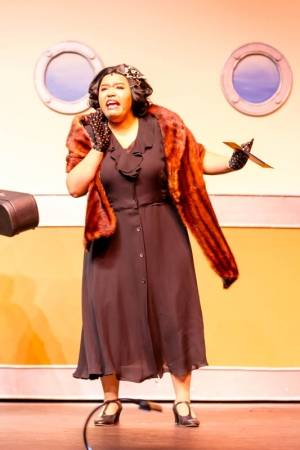 despite his foibles. I wouldn’t have expected to enjoy the intentionally annoying song “Be Like a Bluebird” nearly as much as I did when Dare performed it, and Dare also brought out stronger performances from his castmates whenever he was onstage interacting with them.
despite his foibles. I wouldn’t have expected to enjoy the intentionally annoying song “Be Like a Bluebird” nearly as much as I did when Dare performed it, and Dare also brought out stronger performances from his castmates whenever he was onstage interacting with them.
As for Diener (pictured right), I have now seen her in several local productions and she has never failed to be a standout among the cast. Her performance here as Erma was just as good, culminating in a very funny Act II number in which she warns a besotted quartet of sailors (Pete Barrett, Quinton Ohlsson, Dennis Sims, and Brad “Gil” Yohnka) about the potentially expensive consequences of being romantically involved with her. Diener is definitely on my list of “local actors to watch” and I look forward to her next role, whatever it may be.
The strongest moments of the show did not belong to any individual performer, however, but to the entire ensemble as they came together for the show’s big dance numbers. The performance of the title song at the end of Act I includes a tap number involving the entire cast where it was very apparent that a lot of rehearsal time and dedication had gone into learning the dance steps well enough to perform them with confidence and a sense of infectious fun. Some cast members were clearly more confident than others, but all of them should be proud of their performance. Again towards the beginning of Act II in “Blow, Gabriel, Blow” the cast’s hard work paid off with a really enjoyable huge dance number that was a lot of fun to watch.
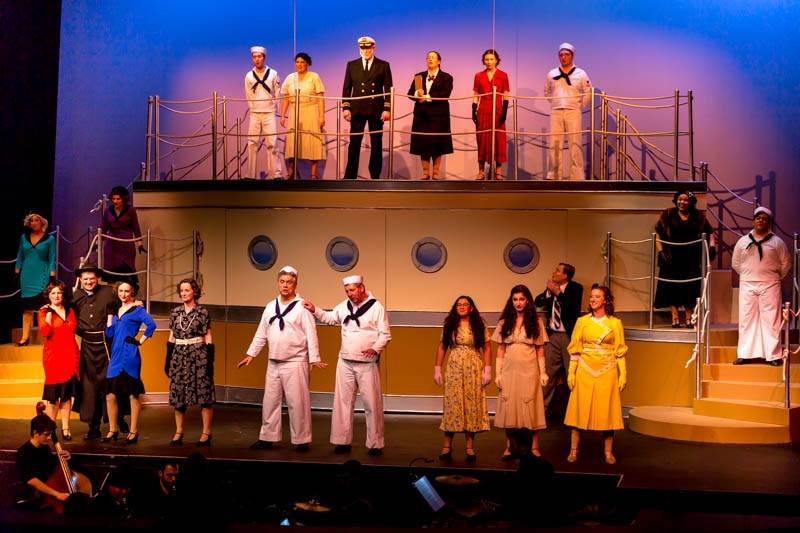
The costumes for this production are nothing short of gorgeous, from Hope’s beautiful dresses to Reno’s vintage wide-legged pants. Costume designer Sheri Doyle has done a phenomenal job channeling 1930s glamour. The set, designed by Molly Ilten-Fullan, is fairly simple visually but works well for easy transitions between scenes above and below deck. Conductor Justin Brauer ably leads the orchestra in its energetic performances of the Cole Porter tunes, and while the Parkland sound system’s flaws always show up in musicals’ big ensemble numbers (usually by rendering people’s solo lines completely inaudible), I felt like there were fewer sound issues with this show than with some others that I’ve seen at Parkland.
Despite my lukewarm feelings towards the show itself, this particular production of “Anything Goes” may be a diverting couple of hours for those who really love Cole Porter, big tap numbers, or just supporting the local arts community. There are a number of truly enjoyable musical numbers that at least partially make up for the weaknesses of the script and there’s a lot of talent among the cast and creative team. If you’re in the mood for undemanding, light-hearted escapist fare over the next few weeks, you may want to make your reservations to board this ship soon.
Anything Goes continues its run for the next two weekends at Parkland’s Harold and Jean Miner Theatre with performances from Thursday-Saturday at 7:30 PM and a performance at 3:00 PM on Sunday, April 23rd. Tickets are $16 with discounted tickets available for students and seniors ($14), youth ($10), and group sales of 15 or more tickets ($12 each). Tickets can be purchased by e-mailing [email protected], calling 217-351-2528, or online. Many performances are expected to sell out.
All images by Scott Wells
[Editor’s note: an earlier edition of this article incorrectly identified an image as Jake Smith. It has been corrected to refer to Ray Essick, and was entirely the fault of the editor, not the writer, both of whom offer sincere apologies for the mistake.]








